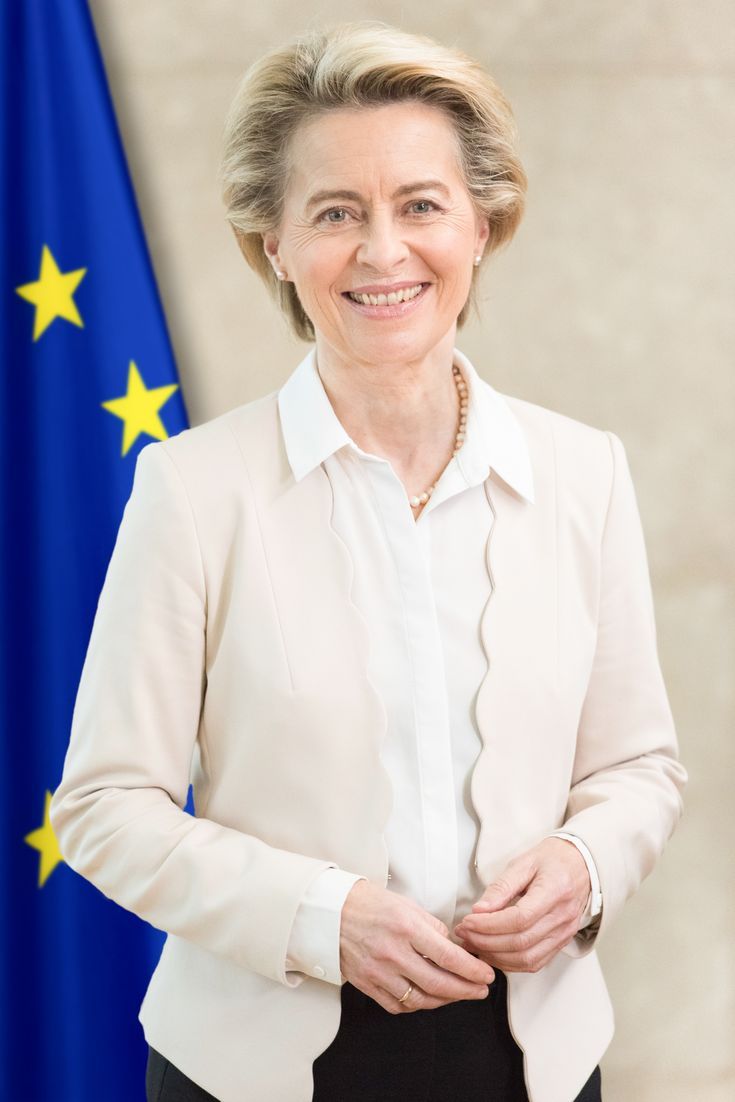Ursula von der Leyen 2025: President of the European Commission
Full Name: Ursula Gertrud von der Leyen
Born: October 8, 1958, Brussels, Belgium
Nationality: German
Political Party: Christian Democratic Union of Germany (CDU)
Office: President of the European Commission (2019–present)
Previous Offices: German Minister of Defense (2013–2019), German Minister for Family Affairs, Senior Citizens, Women, and Youth (2005–2009), Minister for Labor and Social Affairs (2009–2013)
Early Life and Education: Ursula von der Leyen
Ursula von der Leyen was born in Brussels, Belgium, to a family with a long political background. Her father, Ernst Albrecht, was a German politician and civil servant, serving as a member of the European Commission. Growing up in Brussels exposed Ursula to European politics at an early age, influencing her later career in European leadership.
Von der Leyen completed her undergraduate studies in economics and econometrics at the University of Göttingen in Germany, before pursuing a medical degree at the Hannover Medical School. She then worked as an assistant doctor and earned a doctorate in medicine, focusing on women’s health. Her early interest in public service was clearly established, but her transition into politics would soon follow.
Political Career: Rise to European Leadership; Ursula von der Leyen
Early Political Career in Germany: Ursula von der Leyen
Ursula von der Leyen’s political journey began in Germany, where she joined the Christian Democratic Union (CDU). She quickly moved through the ranks of German politics, becoming a member of the Bundestag (German federal parliament) in 2002. She was appointed to key ministerial roles in Chancellor Angela Merkel’s government, starting with the Ministry for Family Affairs, Senior Citizens, Women, and Youth in 2005. In this role, von der Leyen championed policies related to family support, women’s rights, and social welfare.
Von der Leyen later served as Germany’s Minister for Labor and Social Affairs (2009–2013), where she worked on issues related to unemployment, social welfare, and employment reforms. In 2013, she was appointed as Germany’s first female Minister of Defense, a role in which she led reforms in the country’s military forces and represented Germany in international security forums.
Throughout her time in various ministerial positions, von der Leyen gained a reputation for pragmatic leadership, a commitment to gender equality, and an emphasis on social justice. Her success in navigating complex policy areas garnered her recognition both domestically and internationally.
President of the European Commission: Ursula von der Leyen
In 2019, Ursula von der Leyen was nominated by the European Council as the President of the European Commission — the executive branch of the European Union. Her nomination marked a historic moment, as she became the first woman to hold this office. Von der Leyen was confirmed by the European Parliament with a narrow vote, making her the 13th President of the European Commission.
As President, von der Leyen is responsible for leading the European Commission and overseeing its initiatives, proposals, and policies. She also plays a crucial role in representing the European Union globally and ensuring the EU’s internal cohesion. Von der Leyen’s leadership has focused on several key areas, including climate change, digital transformation, economic recovery, foreign relations, and democracy within the EU.
Key Policies and Achievements: Ursula von der Leyen
1. European Green Deal: Ursula von der Leyen
One of von der Leyen’s most ambitious initiatives is the European Green Deal, which seeks to transform Europe into the world’s first climate-neutral continent by 2050. The Green Deal includes a set of policies designed to reduce carbon emissions, increase the use of renewable energy, and promote sustainable development. The initiative also includes the EU Climate Law, which legally commits the EU to achieving net-zero emissions by 2050.
The European Green Deal is central to von der Leyen’s vision of making the EU a global leader in environmental protection and climate action. It has been seen as a major step toward addressing the climate crisis and promoting a sustainable economy.
2. Digital Transformation and Technology: Ursula von der Leyen
Another priority for von der Leyen is the digital transformation of Europe. Under her leadership, the European Commission has focused on enhancing the EU’s digital infrastructure and technological innovation. The Digital Europe Programme was launched to boost the EU’s capabilities in areas like artificial intelligence, cybersecurity, and data governance.
In addition, von der Leyen has advocated for the EU to become more self-sufficient in the digital sector, reducing its dependence on foreign technology companies. This is part of her broader strategy to ensure Europe’s digital sovereignty and create a stronger European tech ecosystem.
3. Economic Recovery Post-COVID-19: Ursula von der Leyen
The COVID-19 pandemic posed one of the greatest challenges to Europe’s economies. In response, von der Leyen championed the NextGenerationEU recovery plan, a €750 billion fund aimed at helping EU member states recover from the economic impact of the pandemic. The plan includes investments in green technologies, digital transformation, and social resilience.
Von der Leyen’s leadership was pivotal in ensuring that the EU responded to the pandemic with solidarity and cooperation across member states. The recovery plan is seen as a key step in rebuilding the European economy while supporting the EU’s long-term goals of sustainability and innovation.
4. Strengthening European Democracy: Ursula von der Leyen
Von der Leyen has worked to strengthen the EU’s democratic institutions and rule of law within member states. She has been vocal in addressing challenges to democracy, particularly in countries like Poland and Hungary, where rule of law and judicial independence have come under threat. Her administration has been active in pursuing policies to protect fundamental rights, freedom of the press, and the judiciary’s independence.
She has also emphasized the importance of democratic values and the need for strong political cohesion within the EU to ensure that it remains a stable and united force in global affairs.
5. Foreign Relations and Global Role: Ursula von der Leyen
Von der Leyen has worked to elevate the EU’s position on the global stage, particularly in areas of trade, security, and geopolitics. She has focused on strengthening the EU’s partnerships with major global powers such as the United States, China, and India, while also emphasizing the importance of the EU’s role in multilateral organizations like the United Nations and World Health Organization.
Von der Leyen has also led the EU’s response to global challenges such as climate change, migration, and human rights. Her leadership is characterized by the vision of making the EU not only a powerful economic bloc but also a champion of global governance, peace, and sustainability.
Challenges and Criticisms: Ursula von der Leyen
While von der Leyen’s leadership has been praised for its focus on climate change and technological innovation, she has faced criticism in several areas:
- Handling of the Vaccine Rollout: The EU’s response to the COVID-19 vaccine rollout was initially seen as slow and disorganized compared to other countries like the United States and the UK. Von der Leyen took responsibility for the EU’s early missteps, and her leadership in securing vaccine contracts was scrutinized.
- Internal EU Divisions: While von der Leyen has worked to strengthen EU unity, she has faced challenges in managing divisions between EU member states, particularly regarding migration policies and the rule of law. Countries like Poland and Hungary have at times clashed with the European Commission over issues of democracy and judicial independence.
- Geopolitical Tensions: Von der Leyen’s leadership has been tested by external geopolitical pressures, such as tensions with Russia over the conflict in Ukraine and the EU’s trade relations with China. Navigating these challenges has required careful diplomatic maneuvering.
Legacy and Future: Ursula von der Leyen
Ursula von der Leyen’s presidency of the European Commission is still unfolding, but her leadership has already had a profound impact on shaping the EU’s future. She is the first woman to hold this office, and her tenure is marked by her efforts to make the EU more sustainable, digital, and inclusive.
Her policies, especially in areas like the Green Deal, economic recovery, and global partnerships, reflect her vision of a modern, resilient Europe capable of facing the challenges of the 21st century. However, her legacy will also depend on how effectively she can navigate internal divisions within the EU, manage external geopolitical pressures, and protect the EU’s democratic values in a changing global landscape.
Von der Leyen is seen as a leader who is working to guide Europe toward a future that is greener, more connected, and more united — while ensuring the EU’s role as a global leader in climate action, technology, and multilateralism.











Добро пожаловать в Azino 777 – мир захватывающих приключений. В Azino 777 вы найдете огромное разнообразие развлечений, включая классические слоты, рулетку, покер и другие популярные игры. Здесь каждый найдет что-то по душе и сможет испытать настоящий азарт.
Azino 777 — это не только увлекательные игры, но и высокие шансы на выигрыши. Мы предлагаем программы лояльности, которые значительно увеличивают шансы на успех и делают вашу игру еще более захватывающей. В Azino 777 важно не только выигрывать, но и наслаждаться каждым моментом игры.
Система безопасности Azino 777 построена на современных методах защиты, чтобы ваши данные и средства всегда были под надежной защитой. Мы гарантируем полную защиту ваших данных, используя лучшие практики в области безопасности для вашего комфорта и уверенности.
В Azino 777 мы всегда предлагаем не только популярные игровые автоматы, но и эксклюзивные бонусы и турниры, которые дают шанс заработать дополнительные призы и бонусы. Присоединяйтесь к нашим регулярным акциям и турнирам, чтобы получить дополнительные выигрыши и ощутить всю атмосферу азартных игр!
Azino 777 – это место для тех, кто ищет острые ощущения, где каждый может испытать неповторимый опыт игры и получить шанс на крупные выигрыши. Присоединяйтесь к Azino 777 и начинайте свой путь к успеху прямо сейчас!